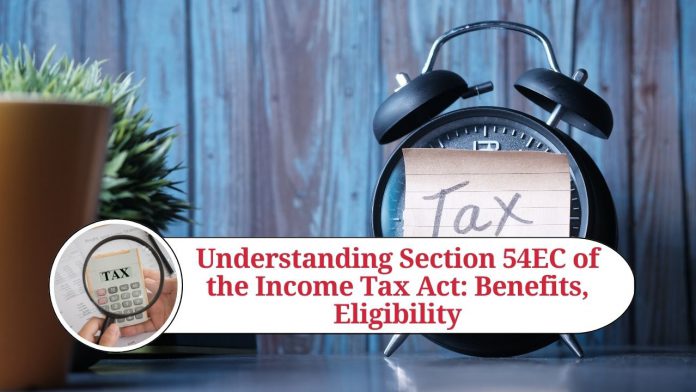Section 54EC of the Income Tax Act, 1961, provides tax benefits to individuals or Hindu Undivided Families (HUFs) who invest capital gains from the sale of a long-term asset into specified bonds within a specified time frame. These bonds are known as “capital gain bonds” or “REC bonds” and are issued by Rural Electrification Corporation (REC) and National Highways Authority of India (NHAI).
Here are some important points to keep in mind about Section 54EC:
- Eligible assets: Only long-term capital gains (LTCG) arising from the sale of specified assets such as land, building, and equity-oriented mutual funds are eligible for exemption under Section 54EC. Short-term capital gains (STCG) are not eligible for exemption under this section.
- Investment limit: The maximum amount that can be invested in these bonds is Rs. 50 lakhs per financial year. If the amount of capital gain is more than Rs. 50 lakhs, the excess amount will be taxed as per the applicable tax rate.
- Time limit: The investment in capital gain bonds must be made within six months from the date of transfer of the long-term asset. In other words, the investment must be made before the due date of filing the income tax return.
- Lock-in period: The investment in these bonds has a lock-in period of three years. The investor cannot sell or transfer the bonds during this period. If the bonds are sold or transferred before the completion of the lock-in period, the capital gains exemption claimed under Section 54EC will be revoked, and the capital gains tax will be levied.
- Interest rate: The interest rate offered by these bonds varies from time to time and is announced by the government at the time of issue. Currently, the interest rate offered by REC bonds is 5.75%, while the interest rate offered by NHAI bonds is 6%.
- Taxation of interest income: The interest earned on these bonds is taxable as per the investor’s applicable tax slab rate.
Investing in capital gain bonds under Section 54EC is a good way to save on taxes while also earning a steady income from the interest earned on the bonds. However, investors should carefully consider the lock-in period and the interest rate offered by these bonds before making an investment decision. It is always advisable to consult a tax expert or a financial advisor before making any investment decision.
- Availability of bonds: These bonds are generally available for a limited period only and are issued periodically. Therefore, investors should keep an eye on the issue dates and availability of these bonds.
- Mode of investment: Investors can invest in these bonds either in physical form or dematerialized form through their demat accounts. However, it is advisable to invest in dematerialized form as it is more convenient and safe.
- Capital gains exemption limit: The capital gains exemption allowed under Section 54EC is over and above the basic exemption limit available to an individual or HUF. For example, if an individual earns a long-term capital gain of Rs. 1 crore and invests Rs. 50 lakhs in these bonds, the entire amount of capital gain will be exempt from tax, and only the remaining Rs. 50 lakhs will be taxed as per the applicable tax rate.
- Non-transferability of bonds: These bonds cannot be pledged or used as collateral for any loan or other purpose during the lock-in period. The bonds can only be transferred to a nominee in case of the investor’s death.
- Redemption of bonds: Investors can redeem these bonds after the completion of the lock-in period of three years. However, the redemption amount will be subject to tax as per the applicable tax rate.
- Applicability to NRIs: Non-resident Indians (NRIs) are also eligible to claim capital gains exemption under Section 54EC by investing in these bonds. However, the tax implications may differ for NRIs depending on their residential status and other factors.
In conclusion
Section 54EC of the Income Tax Act provides an attractive tax-saving option for individuals and HUFs who have earned long-term capital gains from the sale of specified assets. However, investors should carefully consider the terms and conditions of these bonds before investing, including the investment limit, time limit, lock-in period, interest rate, and tax implications. It is advisable to consult a tax expert or financial advisor before making any investment decision.
Read more useful content:
- section 145 of income tax act
- section 10e of income tax act
- section 9 of the income tax act
- section 94b of income tax act
- section 206aa of income tax act
Frequently Asked Questions (FAQs)
Q: What is Section 54EC of the Income Tax Act?
A: Section 54EC provides tax benefits to individuals or Hindu Undivided Families (HUFs) who invest capital gains from the sale of a long-term asset into specified bonds within a specified time frame.
Q: What are the eligible assets for claiming tax benefits under Section 54EC?
A: Only long-term capital gains (LTCG) arising from the sale of specified assets such as land, building, and equity-oriented mutual funds are eligible for exemption under Section 54EC. Short-term capital gains (STCG) are not eligible for exemption under this section.
Q: What is the maximum investment limit under Section 54EC?
A: The maximum amount that can be invested in these bonds is Rs. 50 lakhs per financial year.
Q: What is the time limit for making an investment in these bonds?
A: The investment in capital gain bonds must be made within six months from the date of transfer of the long-term asset. In other words, the investment must be made before the due date of filing the income tax return.
Q: What is the lock-in period for these bonds?
A: The investment in these bonds has a lock-in period of three years.
Q: What is the interest rate offered by these bonds?
A: The interest rate offered by these bonds varies from time to time and is announced by the government at the time of issue. Currently, the interest rate offered by REC bonds is 5.75%, while the interest rate offered by NHAI bonds is 6%.
Q: Can these bonds be transferred or pledged during the lock-in period?
A: No, these bonds cannot be transferred or pledged during the lock-in period. They can only be transferred to a nominee in case of the investor’s death.
Q: Is the interest earned on these bonds taxable?
A: Yes, the interest earned on these bonds is taxable as per the investor’s applicable tax slab rate.
Q: Can NRIs also claim tax benefits under Section 54EC?
A: Yes, NRIs are also eligible to claim capital gains exemption under Section 54EC by investing in these bonds. However, the tax implications may differ for NRIs depending on their residential status and other factors.
Q: What happens if the bonds are sold or transferred before the completion of the lock-in period?
A: If the bonds are sold or transferred before the completion of the lock-in period, the capital gains exemption claimed under Section 54EC will be revoked, and the capital gains tax will be levied.




















